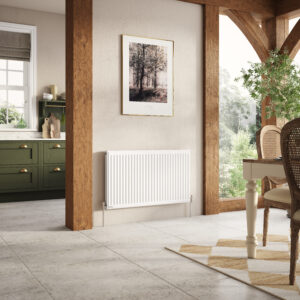What is a Bio-Based Radiator?
As society becomes increasingly conscious of environmental impact, innovations in various industries are steering towards eco-friendly alternatives. Heating solutions are no exception, with the rise of bio-based radiators at the forefront of this green revolution. In this post, we look at the concept of an eco-friendly radiator, exploring its design, materials, and the benefits it can offer.
Bio-based radiators represent a sustainable departure from traditional heating systems. These radiators utilise materials derived from natural sources, such as plant-based extracts or recycled components, in their construction. Unlike their conventional counterparts, a bio-friendly radiator prioritises environmental considerations without compromising on functionality.
The materials employed in bio-based radiators are diverse, showcasing the versatility of sustainable alternatives. From recycled metals to plant-derived composites, these radiators draw upon a spectrum of eco-friendly resources. In particular, manufacturers are experimenting with materials like bamboo, recycled aluminium, and even agricultural waste to craft radiators that are both efficient and environmentally responsible.
The use of recycled metals, such as aluminium, contributes to the circular economy by repurposing materials that might otherwise end up as waste. Bamboo, with its rapid growth and renewability, emerges as a sustainable alternative that reduces dependence on slower-renewing resources. The incorporation of agricultural waste not only repurposes byproducts but also reduces the environmental impact associated with traditional disposal methods.
Benefits of Embracing Eco-friendly Solutions
One of the primary advantages of an eco-friendly radiator is its inherent energy efficiency. These radiators often boast enhanced insulation properties, requiring less energy to maintain optimal heating levels. The reduced environmental impact is a compelling factor. The use of sustainable materials in construction contributes to lower carbon footprints and helps mitigate the adverse effects of climate change.
While the initial investment in a bio-friendly radiator might be slightly higher, the long-term cost savings are substantial. Energy-efficient designs translate to lower utility bills, offering a return on investment over time. Additionally, governments and environmental agencies worldwide are increasingly offering incentives and subsidies for adopting eco-friendly heating solutions, further offsetting the upfront costs.
The emphasis on indoor air quality is a crucial aspect of bio-based radiators. Unlike some older radiators that may release harmful emissions or particles during operation, an eco-friendly radiator prioritises indoor air quality. The absence of toxic components in their construction ensures that occupants are not exposed to harmful substances. This feature is particularly beneficial in residential and commercial spaces, contributing to a healthier and more sustainable living environment.
As individuals become more conscientious about their well-being and the environment, the integration of eco-friendly heating solutions not only enhances comfort but also fosters a sense of responsibility towards the planet. Bio-based radiators, with their multifaceted benefits, are not just a step towards sustainability but also a commitment to creating spaces that prioritise both comfort and the health of our planet.
Environmental Impact and Sustainability
Traditional radiators often rely on materials with high environmental costs. Steel and aluminium extraction, for example, can contribute significantly to carbon emissions and resource depletion. Bio-based alternatives, on the other hand, utilise renewable resources, thereby diminishing the negative impact on ecosystems and biodiversity.
A bio-friendly radiator presents a sustainable solution by prioritising the use of renewable resources and recycled materials. Bamboo, a popular choice, is not only fast-growing but also biodegradable, ensuring a minimal environmental footprint. The lifecycle analysis of these radiators often reveals a more favourable environmental profile compared to their conventional counterparts.
Another example of eco-friendly radiators is the Stelrad Green Steel Series. These radiators are made using steel that is produced using renewable energy. To create this series of radiators, we are employing technology that reduces CO₂ emissions at the source.
Is it a Practical Idea for the Future?
The widespread adoption of bio-based radiators hinges on their feasibility and practicality. Currently, manufacturers are investing in research and development to enhance the efficiency and affordability of these radiators. As technology advances, bio-friendly radiators are becoming increasingly competitive, making them a viable option for both residential and commercial heating needs.
Consumer interest in sustainable living and eco-friendly products is on the rise, and this trend extends to heating solutions. With an increasing awareness of climate change and environmental responsibility, individuals are more likely to consider bio-based radiators as a viable and conscientious choice. Manufacturers are responding to this demand by offering a diverse range of designs and options, including popular choices like column radiators crafted from sustainable materials.
The rise of bio-based radiator materials signifies a promising shift towards more sustainable heating solutions. From reducing environmental impact and energy consumption to promoting indoor air quality and occupant health, these eco-friendly radiators are making a significant impact. As technology continues to evolve, bio-based radiators are likely to become the heating solution of choice for those who prioritise both comfort and environmental responsibility.
Consider our electric column radiators here at Stelrad to contribute to a more eco-friendly future.



